Neeuro’s products and solutions are all based on data and science
We are proud that our all our products and services are backed by data and science. Here is the collection of our white papers and journal articles.
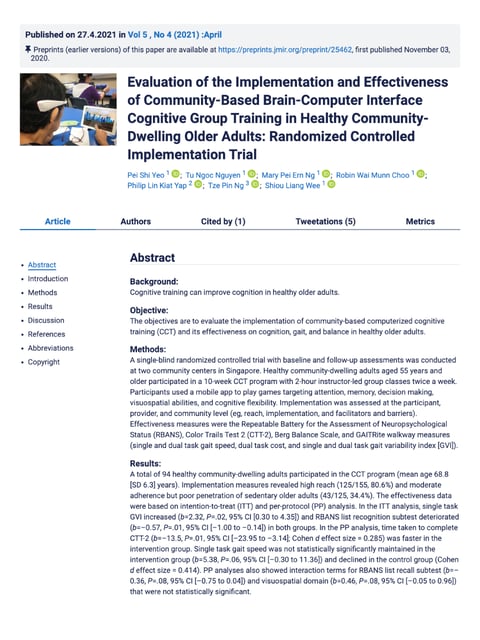
Cognitive training can improve cognition in healthy older adults.
The objectives are to evaluate the implementation of community-based computerized cognitive training (CCT) and its effectiveness on cognition, gait, and balance in healthy older adults.
View the article here.
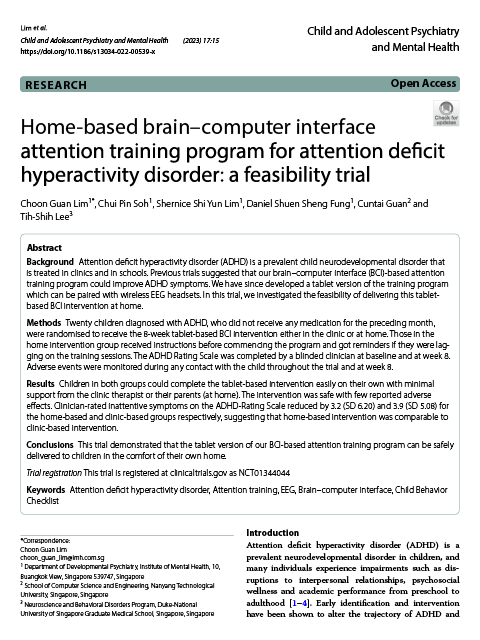
Attention deficit hyperactivity disorder (ADHD) is a prevalent child neurodevelopmental disorder that is treated in clinics and in schools. Previous trials suggested that our brain–computer interface (BCI)-based attention training program could improve ADHD symptoms. We have since developed a tablet version of the training program which can be paired with wireless EEG headsets. In this trial, we investigated the feasibility of delivering this tablet-based BCI intervention at home.
View the article here.
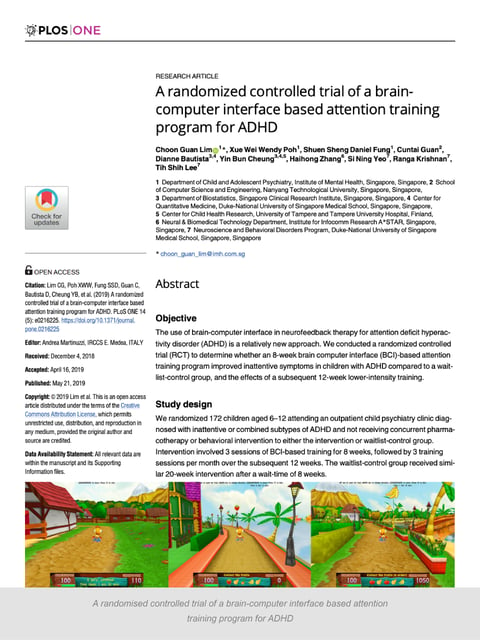
A randomised controlled trial (RCT) was conducted for 172 children aged 6 to 12 attending an outpatient child psychiatry clinic diagnosed with ADHD and not receiving concurrent pharmacotherapy or behavioural intervention. The intervention involved 3 weekly sessions of BCI-based training for 8 weeks, followed by 3 training sessions per month over the subsequent 12 weeks.
The intervention group showed significant improvement in their inattentive symptoms based on clinician rated ADHD Rating Scale (ADHD RS) Inattention score.
Results suggests that this intervention is an option for treating milder cases or as an adjunctive treatment.
View the article here.
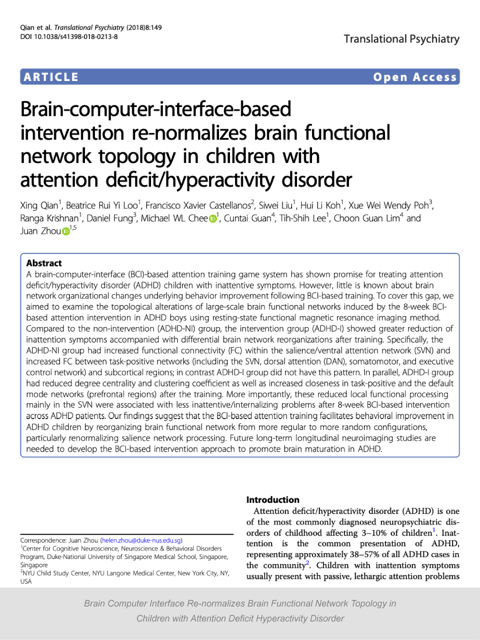
This neuroimaging study is part of a larger randomised controlled study consisting of 172 children with ADHD. This study consisted of 66 boys with ADHD with symptoms of inattentive and combined subtype that went through the BCI based game intervention for 24 sessions over 8 weeks and they were split between intervention and non-intervention groups.
Different brain networking activity was observed in both groups. Children in the intervention group showed reorganised brain network activity – increased closeness in the prefrontal region of the brain that is associated with attention (i.e. less inattentive symptoms).
The focused brain area is activated after BCI intervention as compared to very widespread activation of multiple brain areas in children from the non-intervention group.
View the article here.
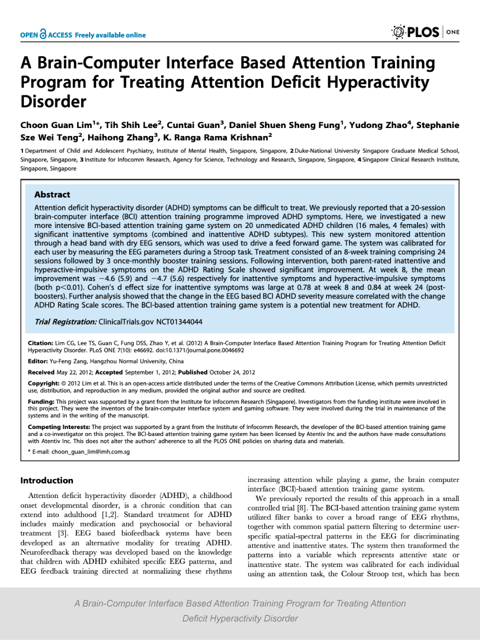
In this study, the BCI-based attention brain training game system was investigated on 20 unmedicated ADHD children aged between 6 to 12 years old with inattentive and combined subtype symptoms. The treatment consisted of 24 sessions of training over 8 weeks followed by 3 once- monthly booster training sessions with only an intervention group.
Following the completion of the intervention, parents-rated ADHD rating scale showed significant improvements in inattentive symptoms and hyperactive- impulsive symptoms.
Better brain scores reflected in the training game was associated with lower ADHD symptoms reported by parents.
View the article here.
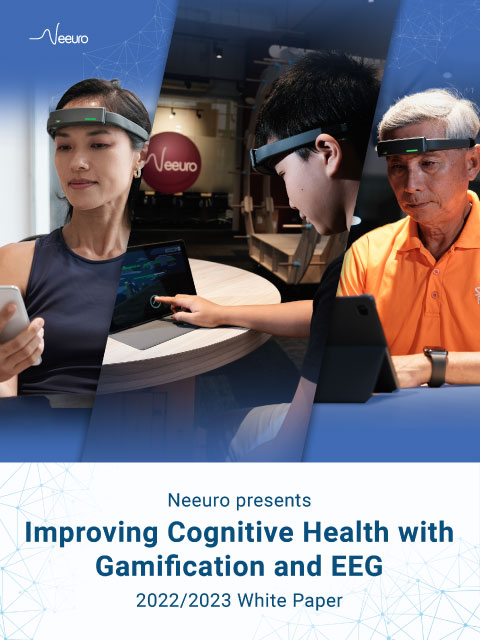
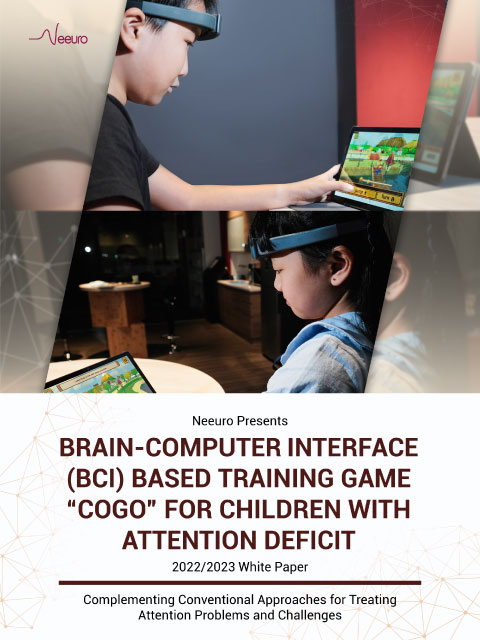
Clinical trials have proven that the use of neurofeedback with Brain-Computer-Interface (BCI) based games is effective at reducing the symptoms of ADHD, complementing current therapies by being non-invasive, conveniently digital and clinical or home-based.
It can be practised with ease while avoiding the downsides of being too much of a time or financial burden.
Read the white paper to know more about complementing conventional approaches for treating attention problems and challenges.
How does our mental state slow down with age?
Everyone knows that our mind slows down when we age, there is no secret behind that. However, at what point does your mind start to retire? Many people disregard the fact that mental decline is a lifelong process, and starts at an early age. Take a look at what the experts have to say, and you will understand our passion in helping you to solve this problem.
Adult age trends in the relations among cognitive abilities Published in: Psychology and Aging Lead Author: Elliot M. Tucker-Drob, Timothy A. Salthouse
When does age-related cognitive decline begin? Published in: Neurobiological Aging Lead author: Timothy Salthouse
Video game training enhances cognitive control in older adults Published in: Nature Lead Author: JA Anguera
How does mental stimulation help me?
In this section, you will find research on how mental stimulation helps to improve your attention, memory, multi-tasking skills.
Improving fluid intelligence with training on working memory Published in: Proceedings of the National Academy of Sciences of the USA Lead Author: Susanne M. Jaeggi, Martin Bushkuehl
The efficacy of working memory training in improving crystallized intelligence Published in: Nature Proceedings Lead Author: Tracy Alloway, Ross Alloway
How can this translate into long term benefits for me?
Research has shown that mental stimulation leads to an increase in memory over time. Keeping your mind stimulated also creates positive effects in your day to day life.
Computerized memory training leads to sustained improvement in visuospatial short-term memory skills in children with Down syndrome Published in: Am J Intellect Dev Disabil Lead Author: SJ Bennet
Strengthened effective connectivity underlies transfer of working memory training to tests of short-term memory and attention Published in: The Journal of Neuroscience Lead Author: Bornali Kundu
Distinct transfer effects of training different facets of working memory capacity Published in: Journal of Memory and Language Lead Author: Claudia C. von Bastian
The relationship between n-back performance and matrix reasoning—implications for training and transfer Published in: Intelligience Lead Author: Susanne M. Jaeggi
Short- and long-term benefits of cognitive training Published in: Proceedings of the National Academy of Sciences of the USA Lead Author: Susanne M. Jaeggi
Preventing Alzheimer’s Disease and Cognitive Decline Published in: AHRQ publication Lead Author: John W Williams
Ten-Year Effects of the ACTIVE Cognitive Training Trial on Cognition and Everyday Functioning in Older Adults Published in: J AM Geriatric Society Lead Author: George W. Rebok
How does mental stimulation work on my brain?
There are studies that show evidence of the changes in the brain. The research highlights how the brain reacts to mental stimulation.
Increased prefrontal and parietal activity after training of working memory Published in: Nature Neuroscience Lead Author: Olesen PJ, Westerberg H, Klingberg T.
London taxi drivers and bus drivers: a structural MRI and neuropsychological analysis Published in: Hippocampus Lead Author: Maguire EA, Woollett K, Spiers HJ.
Who is best suited for mental stimulation?
These studies show that the best results for brain training shows on children, and those approaching their later years in life.
Differential effects of reasoning and speed training in children Published in: Developmental Science Lead Author: Mackey AP, Hill SS
Impact of working memory training on memory performance in old-old adultsPublished in: Psychology Aging Lead Author: Buschkuehl M, Jaeggi SM
Working memory plasticity in old age: Practice gain, transfer, and maintenance Published in: Psychology Aging Lead Author: Li SC, Schmiedek F
Effects of cognitive training interventions with older adults: A randomized controlled trial Published in: The Journal of the American Medical Association Lead Author: Ball K, Berch DB
What problems can brain training be the solution to?
Results has shown that it may help you improve your attention, memory, spatial skills, etc. This section shows research which backs up the claims that mental stimulation can help improve those specific areas.
Family-based training program improves brain function, cognition, and behavior in lower socioeconomic status preschoolers Published in: Proceedings of the National Academy of Sciences of the USA Lead Author: Neville HJ, Stevens C
How useful is executive control training? Age differences in near and far transfer of task-switching training Published in: Developmental Science Lead Author: Karbach J, Kray J
The Lancet: Healthy eating, exercise, and brain trainingPublished in: The Lancet
Does playing games have any benefits for me?
Research does suggest that the right type of games can stimulate minds and make it perform at a much higher level.
Brain training: Games to do you good Published in: Nature Lead Author: Daphne Bavelier & Richard J. Davidson
Reading and solving arithmetic problems improves cognitive functions of normal aged people: a randomized controlled study Published in: AGE Lead Author: Shinya Uchida & Ryuta Kawashima
Games for seniors are not just for fun Published in: The Straits Times Lead Author: Samantha Boh
Neuroplasticity in old age: Sustained fivefold induction of hippocampal neurogenesis by long-term environmental enrichment Published in: Annals of Neurology Lead Author: Gerd Kempermann, Daniela Gast and Fred H. Gage
Video game training enhances cognitive control in older adults Published in: Nature Lead Author: J. Anguera
What is the science behind EEG?
We are often asked, “Are there any scientific proof that the EEG headband paired with the Neuroscience-designed games work?” Here we have compiled our research presenting some significant validation work that shows proof that cognitive performance can be enhanced through EEG-neurofeedback, and recently, EEG-based technology has become more popular in “serious” games designs and developments.
EEG-based local brain activity feedback training—tomographic neurofeedback Published in: National Center for Biotechnology Information, U.S. National Library of Medicine Lead Author: Herbert Bauer, Avni Pllana
Disclaimer: Neeuro products are not medical solutions and should not be used to diagnose or treat any medical condition. Individual results may vary.